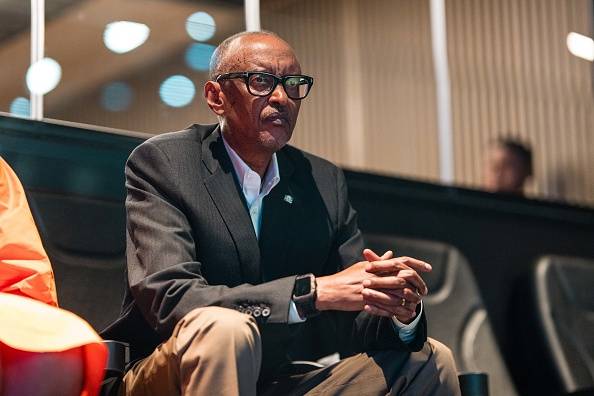
President Paul Kagame. (Photo: Julien Bacot/NBAE via Getty Images)
Rwanda's President Paul Kagame was on track to be sworn in for a fourth term on Tuesday after winning an overwhelming 99.15 percent of the vote in an election in which only two candidates were allowed to run.
Monday's vote left the results beyond doubt, leaving Kagame with an iron fist after three decades of ruling the tiny African nation as de facto leader and then president.
Partial results released by the electoral commission seven hours after polls closed showed Mr Kagame had won 99.15% of the vote, up from the 98.79% he won in the last election seven years ago.
With 79 percent of the votes counted, the results were released showing that Democratic Green Party candidate Frank Habineza received just 0.53 percent of the vote, while independent candidate Philippe Mpaimana received 0.32 percent.
Speaking at the headquarters of his ruling Rwanda Patriotic Front (RPF), the 66-year-old president thanked Rwandans for granting him another five years in office.
“The results that have been released show very high scores but this is not just a number. Even if it was 100 percent, this is not just a number,” he said.
“These figures show confidence, and that's the most important thing,” he added.
“I am hopeful that if we work together we can solve all our problems.”
“Safe and transparent”
Full provisional results are expected by July 20th, and final results by July 27th.
“Overall, the electoral process was conducted in a safe and transparent atmosphere for Rwandans living abroad and in the country,” the National Electoral Commission said in a statement.
In a country where 65 percent of the population is under 30, Kagame is the only leader most Rwandans know.
The bespectacled 66-year-old leader is credited with rebuilding a traumatic country after the 1994 genocide but is accused of creating a climate of fear at home and stoking unrest in neighbouring Democratic Republic of Congo.
For the first time, presidential elections were held simultaneously with parliamentary elections, with over nine million Rwandans registered to vote, including around two million first-time voters.
“(Kagame) is giving us everything we want, like health insurance, that's why he won by a landslide,” said Francois Rwabakina, a 34-year-old mechanic.
Kagame handily defeated the same two challengers in 2003, 2010 and again in 2017, winning with more than 93% of the vote.
He oversaw controversial constitutional changes that shortened presidential terms from seven to five years and reset the term limits of Rwanda's leaders to allow them to rule until 2034.
'Severe restrictions'
A Rwandan court has rejected an appeal by prominent opposition leaders Bernard Ntaganda and Victoire Ingabire to have criminal records quashed that effectively disqualifies them from voting on Monday.
The electoral commission also barred Diane Rwigara, a prominent critic of President Kagame, from running for the election, citing problems with her paperwork – the second time she has been barred from running.
Ahead of the vote, Amnesty International said Rwanda's opposition faces “severe restrictions, intimidation, arbitrary detention, prosecution, trumped-up charges, killings and enforced disappearances.”
The imbalance between the candidates became apparent during the three-week campaign, with the ruling RPF's elaborate public relations machine in full swing.
The party's red, white and blue colours and slogans such as “Tiger Kagame Paul” (“Vote for Paul Kagame”) and “PK24” (“Paul Kagame 2024”) were seen everywhere.
Rivals struggled to make their voices heard, with some events drawing as few as 100 people.
Kagame's RPF militias are hailed for ending the 1994 genocide by marching into Kigali and ousting Hutu extremists who had waged 100 days of bloodshed targeting the Tutsi minority.
The perpetrators killed approximately 800,000 people, mainly Tutsis but also moderate Hutus.
President Kagame has overseen a remarkable economic recovery, with GDP growing at an average annual rate of 7.2 percent between 2012 and 2022, but nearly half of the country's population still lives on less than $2.15 a day, according to the World Bank.
But abroad, Kigali is accused of meddling in conflict-hit eastern Democratic Republic of Congo, where a UN report says its troops are fighting alongside M23 rebels.
In the parliamentary elections, 589 candidates competed for 80 seats, including 53 seats elected by universal suffrage.
In the outgoing parliament, the RPF held 40 seats, its allies 11 and Habineza's party two.
An additional 27 seats have been reserved for women, youth and people with disabilities.
©Agence France-Presse

